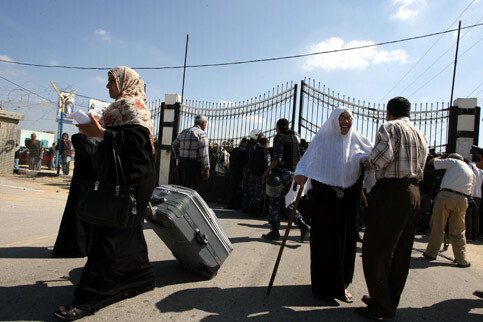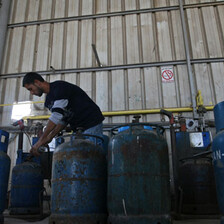The Electronic Intifada 18 June 2008

Palestinians escaping the Israeli siege of the Gaza Strip wait to try and cross into Egypt. Many Egyptians are against their government conducting business with Israel who continues its siege of Gaza denying them basic necessities including fuel, May 2008. (Wissam Nassar/MaanImages)
CAIRO (IPS) - In the last two months, popular and parliamentary opposition to the sale of Egyptian natural gas to Israel — at undisclosed prices — has mounted. As a result, in a rare nod to public opinion, the government recently announced it was “revising” the terms of the sale agreement.
“The government was finally embarrassed into partially addressing our concerns,” Mohammed Anwar al-Sadat, former MP and spokesman for the recently founded Popular Campaign against Gas Exports told IPS.
The full-scale export of Egyptian natural gas to Israel officially began on 1 May. A 2005 agreement between Egypt and Israel allows the Cairo-based East Mediterranean Gas, a joint venture between Egyptian and Israeli businessmen, to sell approximately 1.5 billion cubic meters of Egyptian natural gas annually to the Israel Electric Corporation for a period of 15 years.
After being extracted from Egypt’s Sinai Peninsula, the gas is then pumped via a submarine pipeline to the southern Israeli cities Ashdod and Ashkelon.
The deal follows several years of on-again, off-again negotiations. Talks were often delayed, as Israel’s consistent abuse of Palestinians in the West Bank and Gaza Strip made Egyptian participation in the scheme politically awkward.
But within the last two years, popular animosity against Israel has hardened even further — particularly in light of the Israeli blockade of the Gaza Strip, which shares a border with Egypt. The siege has deprived the territory’s roughly 1.5 million inhabitants of most basic necessities — including fuel — and exposed Egypt to the risk of full-blown humanitarian crisis on its doorstep.
Contentiously, the government has until now refused to reveal the sale price stipulated in the agreement. This has led a number of the deals’ critics to suggest that gas is being sold to Israeli buyers at less than international prices.
The agreement — and the government’s reluctance to reveal the sale price — has come under heavy attack in parliament by opposition and independent MPs. Resistance to the deal has largely been spearheaded by the Muslim Brotherhood movement, the assembly’s largest opposition bloc.
According to Brotherhood MP Saad al-Husseini, the “shameful agreement” constitutes a three-fold crime against the Egyptian public.
“Firstly, it provides energy resources to the hostile Zionist entity which is killing innocent Palestinians and illegally occupying Arab holy places,” al-Husseini told IPS. “Secondly, by selling gas at discounted prices, Egypt is kissing up to the Israelis at the expense of its own impoverished masses.”
“Thirdly, the government has done all this while hiding the terms of the agreement from the people and parliament,” he added.
Al-Husseini went on to question the government’s motives for making the deal in the first place. “It’s as if Israel has some unseen means of exerting pressure on Egyptian decision-making,” he said.
At a parliamentary session last week, Brotherhood representatives formally requested legislative amendments aimed at canceling all fuel export agreements not previously approved by the assembly. The proposal, however, was quickly rejected by the ruling National Democratic Party’s parliamentary majority.
The gas deal has also run up against considerable public opposition. Last month saw the establishment of al-Sadat’s anti-export campaign, which, in an initial statement, declared the 2005 export agreement to be both “illegal and unconstitutional.”
The campaign not only aims to stop gas sales to Israel, but to halt all Egyptian natural gas exports across the board. According to campaign organizers, Egypt’s limited energy resources should be devoted solely to meeting rising domestic energy demand.
“Egyptian natural gas belongs to the Egyptian people, not the government,” said al-Sadat. “If they’re going to sell it, they should at least sell it at international prices.”
Although official estimates put Egypt’s total natural gas reserves as high as three trillion cubic meters, independent estimates have put the figure considerably lower.
“Official reserve figures are extremely questionable,” said al-Sadat. “Egypt’s energy resources are irreplaceable — when they’re gone, they’re gone.”
As for gas sales to Israel in particular, he points out that the issue is political as well as economic.
“There is a popular consensus against cooperation with Israel due to its belligerent policies against the Palestinian and Lebanese people,” said al-Sadat, who, ironically, is a nephew of former president Anwar al-Sadat, the first Arab leader to make peace with the Hebrew state.
On 9 June, campaign organizers held a conference at the Egyptian Journalists Syndicate, attended by hundreds of supporters. At the event, Mahmoud al-Khudry, campaign member and vice-president of Egypt’s Supreme Court, condemned the decision to sell gas to Israel in light of current political circumstances.
“History will remember that Egypt sold gas to Israel,” al-Khudry was quoted as saying in an appeal to President Hosni Mubarak. “Those who advised you to make this deal are traitors to the country.”
The campaign has not been without effect. On the same day, at a parliamentary session devoted to the issue, Petroleum Minister Sameh Fahmy told the assembly that the government would “review all gas export agreements to all countries including Israel.”
However, requests by opposition MPs for the official sale price — and for clarifications as to why the deal was never approved by parliament — were ignored by the minister.
“Fahmi’s statements represented a limited victory for the opponents of the deal,” said the Brotherhood’s al-Husseini. “But we will continue to push for a complete halt to all gas exports to Israel.”
Next week, campaigners are planning to hold a protest march in front of Cairo’s administrative court. The same day, 24 Jun, will also feature the opening session of a court case — raised by a former assistant foreign minister — against the government’s endorsement of the sale.
Campaign organizers are now trying to collect one million signatures for a petition against all Egyptian natural gas exports. “When we achieve this, we’ll march to the presidential palace in Cairo and present our petition directly to the President,” said al-Sadat.
All rights reserved, IPS - Inter Press Service (2008). Total or partial publication, retransmission or sale forbidden.


